Why Don't More Startups Advertise to Angel Investors?
In the Fall of 2013, updates to the JOBS Act introduced significant changes to how startups can solicit funding from investors. In particular the changes to rule 506 allowed, for the first time, the ability to make an offer across virtually all forms of media. This advertisement is known as general solicitation.
Why then do so few startups take advantage of this rule change when raising funds?
I believe there are three big reasons the new rules haven’t spurred significant changes in the fundraising habits of startups:
New Players, Old Rules
Lawyers and advisors are used to the old rules. Old habits are hard to change and lawyers are nothing if not conservative. The potential negative impacts on both the startup and the lawyer from misdirected advice is enough to make many lawyers hesitant to delve into new territory until a status quo has been established.
Who Can Play the Game?
The second reason has to do with accredited versus non-accredited investors. To be an accredited investor you need to have a net worth greater than a million dollars excluding your primary residence or have income over $200,000 each of the last two years (or $300,000 combined income if married) with the expectation of earning at least as much in the current year.
Under rule 506(b), the startup can sell stock to up to 35 non-accredited investors that meet defined sophistication requirements. However, they couldn’t publicly advertise — a practice known as general solicitation — the availability of that offering. Under 506(b) the issuer does not have to go to great lengths establish that buyers meet accredited investor standards. It is OK to have them self-certify, normally with the use of an investor questionnaire.
Under the new rule, 506(c), the startups can advertise, but they must also certify that the investor meets accreditation standards prior to accepting the funds. Since the adoption of the JOBS Act a number of low-cost providers have emerged to enable fast and simple investor certification. The process is now easy enough that it should not discourage fundraising under rule 506(c), though there appears to still be a roadblock for many young companies.
Angel investing is an inherently risky endeavor. In general, I believe that startups should avoid selling stock to non-accredited investors even when they file under rule 506(b). Even if someone meets the definition of a “sophisticated investor”, taking money from a friend or family member that is not an accredited investor is usually a bad idea. Startups can instead use stock options as a meaningful incentive for early employees and advisors.
Tapping Resources
Finally, I suspect that most startups avoid general solicitation because they lack resources. A skilled marketing team is required to configure and manage ad campaigns that target accredited investors.
This may change soon. Facebook, Google, and other channels make it easier to build highly-targeted ad campaigns. As incubators and platforms like AngelMD help companies build these audiences, channels, and creative resources, startups can lower the incurred costs to flight a campaign and generate significant exposure.
We see healthcare startups doing some amazing things. Their innovations are captivating because they have the potential to change our lives in profound ways. These young companies should not be afraid to tell their story to a broad audience when that is the best way to attract investors. They should take advantage of every tool available to raise the funds they need to succeed, and the JOBS Act changes have provided startups with another weapon in their arsenal.




Comments
Post a Comment